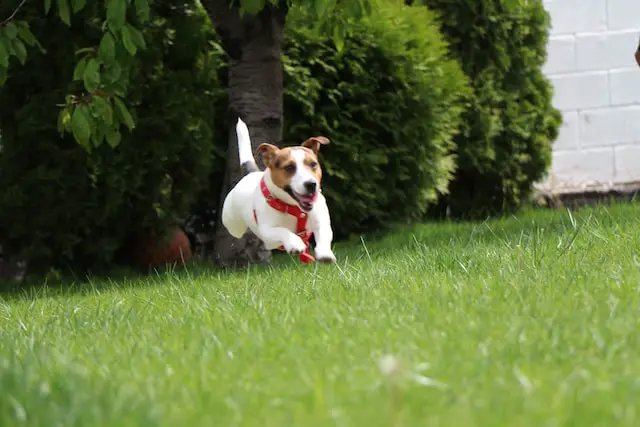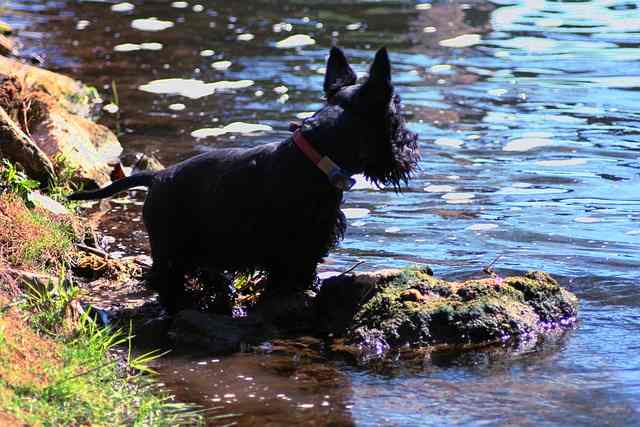Are Jack Russells dangerous? Debunking Myths and Revealing the Facts”

When it comes to Jack Russells, a popular breed of small to medium-sized dogs known for their energetic nature and feisty personalities, one question that often comes to mind is: are they dangerous?
Due to their high energy levels and determination, misconceptions about their temperament and behavior may have led to questions about their safety as pets.
In this article, we will delve into the reality of Jack Russells and their reputation as potentially dangerous dogs. We will address common misconceptions and provide accurate information based on facts to shed light on their temperament, behavior, and suitability as pets.
Whether you’re a current Jack Russell owner, considering getting a Jack Russell, or simply curious about this breed, this article aims to provide a balanced and informed perspective on the question of Jack Russells’ safety.
It’s important to understand that a dog’s behavior is influenced by various factors, including genetics, upbringing, training, and environment.
Throughout this article, we will explore various aspects of Jack Russell behavior, addressing topics such as aggression towards humans and other animals, trainability, temperament around children and strangers, and other factors that contribute to their overall safety as pets.
By providing accurate information and dispelling myths, this article aims to provide a balanced and informed perspective on the question of whether Jack Russells are dangerous or not.
Let’s delve into the facts and debunk the myths about Jack Russells to gain a clear understanding of their true nature and behavior.
Are Jack Russells dangerous?
From the perspective of many Jack Russell owners and enthusiasts, Jack Russells are not considered inherently dangerous. When properly trained, socialized, and cared for, Jack Russells can make loving, loyal, and well-behaved pets.
Jack Russells are known for their intelligence, agility, and high energy levels. They are typically bold, curious, and confident dogs that thrive on mental and physical stimulation. With consistent training and socialization from an early age, Jack Russells can develop into well-mannered and obedient companions.
Like any other breed of dog, Jack Russells can display behaviors that may be perceived as potentially dangerous if not properly managed. For example, their strong prey drive may lead to chasing small animals, and their assertiveness may result in territorial behavior. However, these traits can be addressed through positive reinforcement training and appropriate management.
It’s important to note that aggressive behavior in Jack Russells or any other dog breed is not inherent, but rather a result of various factors such as improper handling, lack of socialization, or inadequate training. Responsible dog ownership, including proper training, socialization, and management, is key in ensuring that Jack Russells or any other breed of dog behaves safely and appropriately.
Do Jack Russells get aggressive?
Jack Russells, like any other breed of dog, have the potential to display aggressive behavior. However, it’s important to understand that aggression in dogs is typically a result of various factors, including genetics, environment, training, and individual temperament. It’s not inherent to the breed itself.
Jack Russells are known for their high energy levels and assertive nature, which can sometimes be misconstrued as aggression.
They are terriers, bred for hunting small game, and their natural instincts can manifest in assertive or even dominant behavior. However, with proper training, socialization, and responsible ownership, Jack Russells can be well-behaved and non-aggressive pets.
It’s crucial to note that aggression in Jack Russells, or any breed, is not an acceptable trait and should be addressed and managed appropriately.
Aggressive behavior in dogs can pose a risk to humans and other animals, and it’s essential to take steps to prevent and address it.
To minimize the likelihood of aggression in Jack Russells, early socialization and training are crucial. Exposing them to a wide range of experiences, people, and other animals from a young age can help them learn appropriate behaviors and develop good manners.
Positive reinforcement training methods, such as reward-based training, can be effective in teaching them acceptable behaviors and building a strong bond between the dog and their owner.
It’s also essential to provide regular physical and mental exercise to help channel their energy and prevent boredom, which can contribute to behavior problems. A well-exercised and mentally stimulated Jack Russell is less likely to display aggressive behavior.
Additionally, responsible ownership plays a key role in preventing aggression in Jack Russells. Providing a safe and secure environment, managing triggers that may cause stress or fear, and avoiding situations that may provoke aggression are important steps to prevent aggressive behavior in Jack Russells or any other dog.
While Jack Russells have the potential to display aggressive behavior, it’s not inherent to the breed itself.
With proper training, socialization, and responsible ownership, Jack Russells can be well-behaved and non-aggressive pets.
It’s important to take proactive measures to prevent and address any signs of aggression in Jack Russells or any other breed of dog to ensure the safety and well-being of everyone involved.
Are Jack Russells safe?
Yes, Jack Russells can be safe when they are properly trained, socialized, and responsibly cared for by their owners. As with any dog breed, safety largely depends on how the dog is raised, trained, and managed.
Jack Russells, known for their active and energetic nature, require regular exercise, mental stimulation, and training to thrive.
When provided with appropriate outlets for their energy and instincts, such as regular walks, playtime, and training sessions, they are less likely to develop undesirable behaviors or pose a safety risk.
Socialization is also a crucial aspect of raising a safe Jack Russell. Introducing them to various people, animals, and environments from a young age can help them develop positive social skills and reduce the likelihood of fear or aggression towards new experiences.
Responsible ownership is essential for ensuring the safety of Jack Russells. This includes providing them with a safe and secure environment, managing potential triggers or stressors, and following responsible dog ownership practices such as proper containment, identification, and vaccinations.
It’s important to note that no dog is inherently safe or dangerous solely based on their breed. The behavior and temperament of a Jack Russell, or any other dog, are influenced by various factors, including genetics, environment, training, and individual personality.
Jack Russells can be safe when provided with proper training, socialization, and responsible ownership. It’s crucial to invest time and effort in raising a well-behaved and well-socialized Jack Russell to ensure their safety and the safety of those around them.
Is a Jack Russell a good family dog?

Jack Russells can make good family dogs under the right circumstances. However, it’s important to understand that not all Jack Russells may be suitable for every family, as their temperament and energy levels may vary.
Jack Russells are known for their high energy levels, intelligence, and strong prey drive. They are typically active, alert, and independent dogs that require regular exercise, mental stimulation, and training. They excel in activities such as obedience, agility, and tracking.
If a family is active and committed to providing ample exercise, mental stimulation, and training to a Jack Russell, they can make excellent family companions. Jack Russells can form strong bonds with their family members and be affectionate and loyal pets.
However, it’s important to note that Jack Russells may not be suitable for all families. Their high energy levels and strong prey drive may not be a good match for families with young children, elderly individuals, or those with limited physical capabilities. Their independent and assertive nature may require experienced and consistent handling, and they may not always do well in households with other small pets.
Proper socialization and training from a young age are essential in raising a well-behaved Jack Russell that can safely interact with all family members. Supervision and management may also be necessary to prevent any potential conflicts or undesirable behaviors.
In conclusion, Jack Russells can make good family dogs for families that are active, committed to providing proper exercise, mental stimulation, and training, and are experienced in handling the breed’s unique characteristics. It’s important to carefully consider the compatibility of a Jack Russell with the specific dynamics and lifestyle of a family before bringing one into the home.
Are Jack Russells safe with babies?
Jack Russells, like any other dog breed, should always be supervised around babies and young children. While Jack Russells can be affectionate and tolerant towards children, their high energy levels and prey drive may pose a potential risk if not properly managed.
It’s important to teach children how to interact safely and respectfully with dogs, including Jack Russells. This includes avoiding rough play, not pulling on the dog’s ears or tail, and not disturbing the dog while they are eating or sleeping. Also, babies and young children should never be left alone with a Jack Russell or any other dog, as accidents or incidents may occur.
Proper socialization and training are crucial in raising a Jack Russell that can safely interact with babies and young children. Early exposure to children and positive experiences can help them develop tolerance and patience towards them. It’s also important to teach the dog basic obedience commands, such as “sit,” “stay,” and “leave it,” to ensure they can respond to cues and commands when interacting with babies or young children.
Moreover, providing the Jack Russell with their own designated safe space, such as a crate or a separate room, where they can retreat to when they need alone time can help prevent any potential stress or anxiety in their interactions with babies or young children.
It’s important to remember that no dog, including Jack Russells, should ever be left unsupervised with babies or young children. Responsible supervision, proper training, and teaching children about safe interactions with dogs are key factors in ensuring the safety of both the child and the dog in any household.
Is it normal for Jack Russells to bite?
Like any dog breed, Jack Russells have the potential to bite, but it is not considered normal or acceptable behavior. Biting behavior in Jack Russells, or any other dog, is usually a result of various factors, including genetics, upbringing, environment, and individual temperament.
It’s important to note that aggression or biting behavior in Jack Russells is not inherent or characteristic of the breed itself, but rather a result of various influences. Proper socialization, training, and responsible ownership are essential in preventing biting behavior in Jack Russells.
To prevent biting behavior in Jack Russells, early socialization and training are crucial. This includes exposing the dog to various people, animals, and environments in a positive and controlled manner to help them develop good social skills and reduce fear or anxiety. Basic obedience training, such as teaching the dog to respond to commands like “sit,” “stay,” and “leave it,” can also help establish boundaries and manners.
Additionally, responsible ownership includes providing regular exercise, mental stimulation, and a safe environment for the Jack Russell to prevent boredom or frustration, which can contribute to aggressive behavior. Proper supervision and management, especially in situations where the Jack Russell may feel stressed or threatened, can also prevent biting incidents.
If a Jack Russell exhibits aggressive or biting behavior, it’s important to seek professional help from a qualified dog behaviorist or trainer. They can assess the underlying causes of the behavior and provide guidance on proper training and management techniques to address and prevent biting behavior in Jack Russells.
While Jack Russells, like any other dog breed, have the potential to bite, it is not considered normal or acceptable behavior. Early socialization, training, responsible ownership, and seeking professional help, when needed, are key factors in preventing biting behavior in Jack Russells or any other dog.
Are Jack Russells jealous?
As with any dog, Jack Russells are capable of displaying behaviors that may be interpreted as jealousy, such as resource guarding, attention-seeking, or possessiveness. However, it’s important to note that these behaviors are not necessarily indicative of jealousy in the same way humans experience it.
Dogs, including Jack Russells, are primarily motivated by instinct and their behaviors are often driven by basic needs, such as food, shelter, and companionship. When a Jack Russell exhibits behaviors that may be interpreted as jealousy, it’s more likely that they are trying to protect their resources or seek attention rather than experiencing complex emotions like humans do.
It’s important for Jack Russell owners to understand and manage these behaviors through proper training and socialization. This includes teaching the dog basic obedience commands, providing consistent rules and boundaries, and rewarding positive behaviors. It’s also crucial to avoid reinforcing possessive or attention-seeking behaviors, as this can perpetuate and exacerbate the issue.
Proper socialization with other dogs and people, exposure to different environments, and positive reinforcement training can also help reduce possessive or jealous behaviors in Jack Russells. It’s important to create a positive and structured environment for the dog, where they feel secure and their basic needs are met.
If a Jack Russell exhibits possessive or jealous behaviors that are causing issues, it’s important to seek guidance from a professional dog trainer or behaviorist. They can provide tailored strategies and techniques to address the specific behaviors and help prevent any potential issues from escalating.
In conclusion, while Jack Russells, like any other dog breed, may exhibit behaviors that could be interpreted as jealousy, it’s important to understand that their motivations are driven by instincts and basic needs. Proper training, socialization, and management are essential in addressing and preventing possessive or jealous behaviors in Jack Russells.
Are Jack Russells smart?

Jack Russells are known to be intelligent dogs. They are quick learners and can excel in various activities, including obedience training, agility, and problem-solving tasks. Jack Russells have a keen sense of observation and can quickly understand and respond to cues and commands from their owners.
One of the reasons Jack Russells are considered smart is their history as hunting dogs. They were bred to work independently and make quick decisions in the field while hunting small game. This instinct for problem-solving and independent thinking has been retained in modern Jack Russells, making them intelligent and adaptive dogs.
However, it’s important to note that intelligence can vary among individual dogs, regardless of breed. Some Jack Russells may be more naturally inclined towards problem-solving and learning, while others may require more patience and consistent training. It’s crucial to understand and adapt to the unique personality and learning style of each Jack Russell.
To harness the intelligence of a Jack Russell, consistent and positive training methods should be used. Reward-based training, using treats, praise, and play, can be highly effective in motivating Jack Russells to learn and perform desired behaviors. It’s also important to provide regular mental stimulation, such as puzzle toys, interactive games, and training sessions, to keep their minds engaged and prevent boredom.
Jack Russells are generally considered intelligent dogs due to their history as hunting dogs and their ability to quickly learn and adapt to different tasks. However, individual variations in intelligence may occur, and consistent, positive training methods are key to harnessing and developing the intelligence of a Jack Russell.
Do Jack Russells have a strong bite?
Jack Russells have a strong bite force due to their history as hunting dogs. They were originally bred to hunt and catch small game, such as rats and rabbits, and their bite strength was essential for dispatching their prey. This innate trait has been retained in modern Jack Russells, making them capable of delivering a strong bite when necessary.
It’s important to note that while Jack Russells have a strong bite, their temperament and behavior are influenced by their upbringing, training, and socialization. Proper training and socialization from an early age can help ensure that a Jack Russell uses their bite strength appropriately and does not exhibit aggressive or dangerous behaviors towards people or other animals.
As responsible pet owners, it’s essential to provide appropriate outlets for a Jack Russell’s natural instincts, such as providing toys for chewing and interactive play. Additionally, teaching them bite inhibition, which is the ability to control the force of their bite, through positive reinforcement training can also help in managing their bite strength.
It’s also crucial to understand that any dog, regardless of breed, has the potential to bite if they feel threatened, scared, or provoked. It’s important to always approach and interact with any dog, including Jack Russells, in a calm and respectful manner, and to supervise interactions with children to prevent accidents.
Jack Russells do have a strong bite due to their hunting heritage, but proper training, socialization, and responsible ownership are key in ensuring that they use their bite strength appropriately and do not pose a danger to people or other animals.
Why do Jack Russells stare at you?

Jack Russells are known for their intense gaze and can often stare at their owners or other people for extended periods. There are several reasons why Jack Russells may exhibit this behavior:
- Attention-seeking: Jack Russells are intelligent and highly energetic dogs, and they may stare at their owners as a way to seek attention. They may be trying to communicate their desire for play, exercise, or interaction.
- Curiosity: Jack Russells are naturally curious dogs, and they may stare at people or objects to observe and understand their surroundings. They are keen observers and may use their intense gaze as a way to gather information about their environment.
- Bonding: Staring can also be a sign of affection and bonding. Jack Russells are known for their strong bond with their owners, and staring can be a way for them to express their love and loyalty.
- Prey drive: Jack Russells are hunting dogs, and their staring behavior may be related to their natural prey drive. They may be instinctively monitoring their surroundings for potential prey, which can include small animals, birds, or even insects.
- Training and commands: Jack Russells are highly trainable, and staring can also be related to their training. They may be waiting for a cue or command from their owner, or they may be anticipating a reward for good behavior.
It’s important to understand that staring behavior in Jack Russells is typically not a sign of aggression or danger. However, if the staring is accompanied by other signs of discomfort, fear, or aggression, it’s crucial to seek professional help from a qualified dog behaviorist or veterinarian to address any underlying issues.
In conclusion, Jack Russells may stare at people or objects for various reasons, including attention-seeking, curiosity, bonding, prey drive, or training. Understanding the reasons behind this behavior can help owners better interpret and manage their Jack Russell’s behavior.
Are Jack Russells fearless?
Yes, Jack Russells are often described as fearless dogs. They are known for their boldness, confidence, and high energy levels. Jack Russells were originally bred as hunting dogs, specifically for chasing and hunting small game, which required them to be brave and tenacious.
Jack Russells have a strong prey drive and are not easily intimidated by larger animals or challenging situations. They are known to display fearlessness and courage in the face of obstacles, making them excellent hunters and watchdogs.
However, it’s essential to note that while Jack Russells are known for their fearlessness, they are still dogs and can experience fear or anxiety in certain situations. Each dog is an individual with their own temperament and personality, and some Jack Russells may be more cautious or reserved than others.
It’s crucial for Jack Russell owners to provide proper socialization, training, and guidance to help their dogs develop appropriate coping skills and manage any potential fear or anxiety. Early and positive socialization experiences, along with consistent training and reinforcement, can help Jack Russells grow into well-adjusted, confident, and fearless dogs.
In conclusion, Jack Russells are generally known for their fearlessness and boldness, which are traits that were selectively bred for their original hunting purpose.
However, individual temperament and personality can vary, and it’s important for owners to provide proper socialization and training to help their Jack Russells develop into confident and well-adjusted dogs.
Are Jack Russells hard to train?
Jack Russells are known to be intelligent and independent dogs, which can make training a bit challenging at times. They are highly active and curious dogs that can sometimes have a short attention span, making it necessary for owners to use patience, consistency, and positive reinforcement techniques.
One of the reasons why Jack Russells may be perceived as hard to train is their high energy levels and strong prey drive, which can make them easily distracted and focused on chasing small animals. Additionally, their independent nature may result in them being stubborn or resistant to certain commands or tasks.
However, with proper training techniques and consistent effort, Jack Russells can be trained effectively. It’s important to start training from an early age and use positive reinforcement methods, such as treats, praise, and rewards, to motivate and encourage desired behaviors.
Training sessions should be kept short and engaging, and it’s crucial to provide mental and physical stimulation to keep Jack Russells mentally engaged and satisfied.
It’s also important to establish clear rules and boundaries for Jack Russells and be consistent in enforcing them. Consistency and patience are key when training Jack Russells, as they respond best to positive reinforcement and reward-based methods.
While Jack Russells may have a reputation for being challenging to train due to their high energy levels, curiosity, and independent nature, with proper training techniques, consistency, and patience, they can be trained effectively.
It’s important to start training early and use positive reinforcement methods to encourage desired behaviors and establish clear rules and boundaries.
Why are Jack Russells difficult?
Jack Russells can be perceived as difficult due to their unique personality traits and characteristics. They are known for their high energy levels, strong prey drive, and independent nature, which can sometimes present challenges in their training and management.
One reason why Jack Russells may be considered difficult is their high activity level. They are highly energetic and require regular exercise and mental stimulation to keep them engaged and prevent boredom. If their exercise and mental stimulation needs are not met, they may exhibit undesirable behaviors such as excessive barking, digging, or destructive chewing.
Additionally, Jack Russells have a strong prey drive, which can make them prone to chasing small animals, such as squirrels or birds, when off-leash. This can pose challenges in terms of recall and off-leash training, as their instinct to chase may override commands.
Furthermore, Jack Russells are known for their independent nature, which can make them stubborn or resistant to certain commands or tasks. They may require additional patience, consistency, and positive reinforcement to motivate them to comply with commands or behaviors.
It’s important to understand that Jack Russells have a unique personality and may require extra effort in terms of training and management compared to other breeds.
However, with proper understanding, consistent training, and adequate exercise and mental stimulation, Jack Russells can be well-behaved and enjoyable pets.
Are Jack Russells good alone?

Jack Russells are social animals and generally thrive on human interaction and companionship. They are known to be loyal and affectionate towards their owners, and they enjoy being part of a family or pack. However, Jack Russells can also be left alone for reasonable periods of time, provided their needs are met.
While Jack Russells can tolerate being alone for moderate durations, it’s important to ensure that they have a stimulating environment and are provided with enough mental and physical enrichment to prevent boredom or anxiety. Providing them with toys, puzzle feeders, and opportunities for exercise and play can help keep them mentally and physically engaged during times when they are alone.
It’s also crucial to establish a routine and gradually increase the duration of time that they are left alone to help them adapt and feel comfortable. Crate training can also be beneficial in providing a safe and secure space for them when left alone.
In some cases, Jack Russells may exhibit undesirable behaviors such as excessive barking, digging, or destructive chewing when left alone for long periods without adequate stimulation or attention. This can be minimized by ensuring that they have ample mental and physical stimulation, and by gradually increasing the duration of time they are left alone.
As with any dog, the ability of a Jack Russell to be alone comfortably can vary depending on their individual temperament, training, and environment. It’s important to assess the needs and behaviors of your Jack Russell and provide appropriate measures to ensure their well-being when left alone. Consulting with a qualified veterinarian or professional dog trainer can also provide valuable guidance on this matter.
Do Jack Russells like humans?
Jack Russells are known for their affectionate and loyal nature towards their human companions. They often enjoy spending time with their owners and forming strong bonds with them. These dogs thrive on human interaction and attention and can be quite loving and devoted.
Whether it’s playing, cuddling, or participating in training exercises, Jack Russells are known to enjoy being involved in various activities with their humans.
Proper socialization and positive reinforcement training from an early age can further enhance the bond between Jack Russells and their human family members. Regular interaction, affection, and praise can help foster a positive relationship and strengthen the bond of trust between Jack Russells and their humans.
It’s important to note that individual temperament and personality can vary among Jack Russells, just like any other dog breed. Some may be more outgoing and affectionate, while others may be more reserved or independent. It’s crucial to understand and respect the unique personality and preferences of each Jack Russell and provide them with the appropriate care, attention, and socialization they need to thrive.
Jack Russells are generally known to enjoy the company of humans and form strong bonds with their owners.
However, as with any dog, it’s important to provide proper care, training, and socialization to ensure a healthy and positive relationship between Jack Russells and their human companions.
Consulting with a qualified veterinarian or professional dog trainer can provide further guidance on fostering a loving and positive relationship with your Jack Russell.
Do Jack Russells like strangers?
As a breed known for their alert and protective nature, Jack Russells may exhibit cautious or reserved behavior towards strangers. They are instinctively wary of unfamiliar people and may require proper socialization and training to feel comfortable in new situations or around strangers.
Early and consistent socialization can play a crucial role in shaping a Jack Russell’s behavior towards strangers. Exposing them to different people, environments, and experiences in a positive and controlled manner from a young age can help them develop confidence and become more relaxed around strangers.
It’s important to note that individual temperament and personality can also influence how Jack Russells respond to strangers. While some Jack Russells may be more outgoing and friendly towards strangers, others may be more reserved or cautious.
It’s essential to respect and understand the unique personality of each Jack Russell and provide them with the appropriate guidance and training to feel secure and comfortable in various social situations.
Additionally, proper training and management techniques, such as teaching obedience commands, practicing positive reinforcement, and using appropriate leashing and supervision, can help ensure that Jack Russells interact safely and appropriately with strangers.
In conclusion, Jack Russells may exhibit cautious or reserved behavior towards strangers, but with proper socialization, training, and management, they can learn to navigate new situations and interact safely.
Understanding and respecting the unique personality and preferences of each Jack Russell is crucial in fostering positive interactions with strangers.
Consulting with a qualified veterinarian or professional dog trainer can provide further guidance on socializing Jack Russells and managing their behavior around strangers.
How protective are Jack Russells?
Jack Russells are known to be a protective breed, as they have a strong instinct to protect their loved ones. They are loyal and devoted to their families, and may exhibit protective behaviors when they perceive a threat or danger.
When it comes to protecting their families, Jack Russells may display behaviors such as barking, growling, or even attempting to physically intervene in a perceived threat. They are alert and will often react quickly to any potential danger they perceive in their surroundings.
It’s important to note, however, that Jack Russells are not aggressive by nature, but rather, they are instinctively protective. Proper training and socialization from an early age can help ensure that their protective instincts are channeled in a positive and controlled manner.
As with any breed, the level of protectiveness in Jack Russells can vary from individual to individual. Some Jack Russells may be more naturally protective, while others may exhibit less protective behaviors.
It’s crucial to understand and respect the unique personality and temperament of each Jack Russell and provide them with the appropriate training and management techniques to ensure they can be protective in a safe and controlled manner.
It’s also important to remember that while Jack Russells may be protective, it’s essential to manage their behaviors appropriately to avoid any potential aggression towards people or other animals.
Seeking guidance from a qualified veterinarian or professional dog trainer can provide further insights and assistance in managing and channeling Jack Russell’s protective instincts in a positive and responsible way.
In conclusion, Jack Russells are known to be protective, but proper training, socialization, and management are crucial in ensuring that their protective behaviors are channeled in a safe and controlled manner.
Understanding and respecting the unique personality of each Jack Russell is key in fostering a healthy and responsible protective behavior towards their families.
Final verdict
Jack Russells are not inherently dangerous dogs. With proper care, training, and socialization, they can make wonderful and loving pets. It’s important to approach dog ownership responsibly, invest time and effort in training and socializing your Jack Russell, and provide a safe and nurturing environment to prevent any potential risks and foster a positive relationship with your furry companion.
Like any other breed, their behavior depends on how they are raised, trained, and managed. With proper care, training, and socialization, Jack Russells can make loving, loyal, and well-behaved pets.
Responsible dog ownership, including adequate training, socialization, and management, is key to ensuring a safe and enjoyable experience with your Jack Russell or any other dog breed.
So, if you’re considering getting a Jack Russell, rest assured that they can be wonderful companions with the right care and attention.








I truly enjoyed all you that was printed regarding the Jack Russell breed great insight.
THANKS